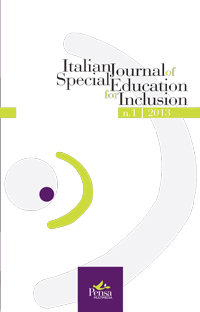Sulle “tracce” della corporeità nella pedagogia speciale
Abstract
There are educational dimensions which, significantly, qualify and contribute to define the different realities of help and care, and among them emerges the culture of the body. In fact, the experience of the body cannot be simply implemented as subsidiary or integrative dimension of educational care and of the development of learnings. The “actors” involved in the educational relationship must renew their understanding of the “instructional” environment as a stimulus and as a resource towards full realization of bodily and gestural identity. This must lead to a deeper debate within the current pedagogical reflection in regards of the processes of inclusion. In this perspective, the corporeality plays a key role in the organization that emerges in terms of sensory, perceptual and cognitive awareness. The development of inclusive education is, therefore, confronted with specialeducational needs through the notion of expressiveness, especially because it offers the people who find themselves in situation of disability the possibility to express their voice and be heard.
Then, to the extent that there are metatheories that allow to establish the conceptual framework of a disembodied mind, there are theoretical models which can form the basis of an understanding of embodiment where the lived body and the physical body are seen in complementary sense as inseparable. Finally, the added value of corporeality in the practices of inclusive education allows to see the person in the complex uniqueness of his existence and to know how to grasp the potential
of inter-individual and intrapersonal learning.
##submission.downloads##
Pubblicato
2014-10-28
Fascicolo
Sezione
I. RIFLESSIONE TEORICA (a. incontro con la storia; b. questioni epistemologiche)


